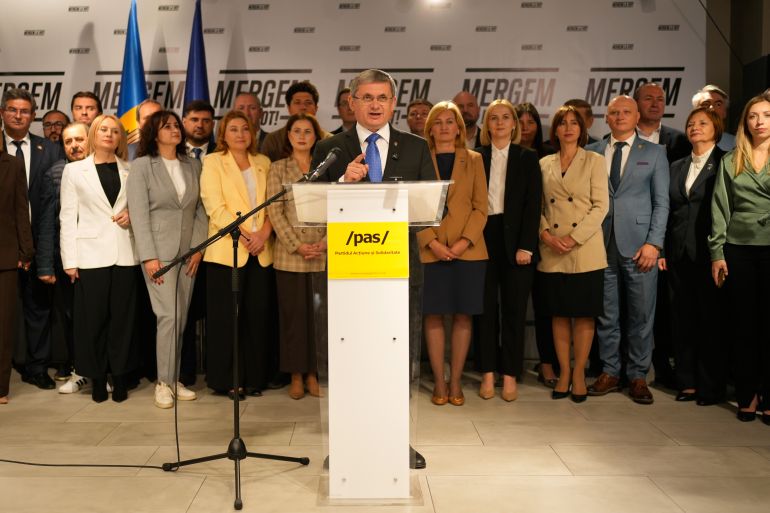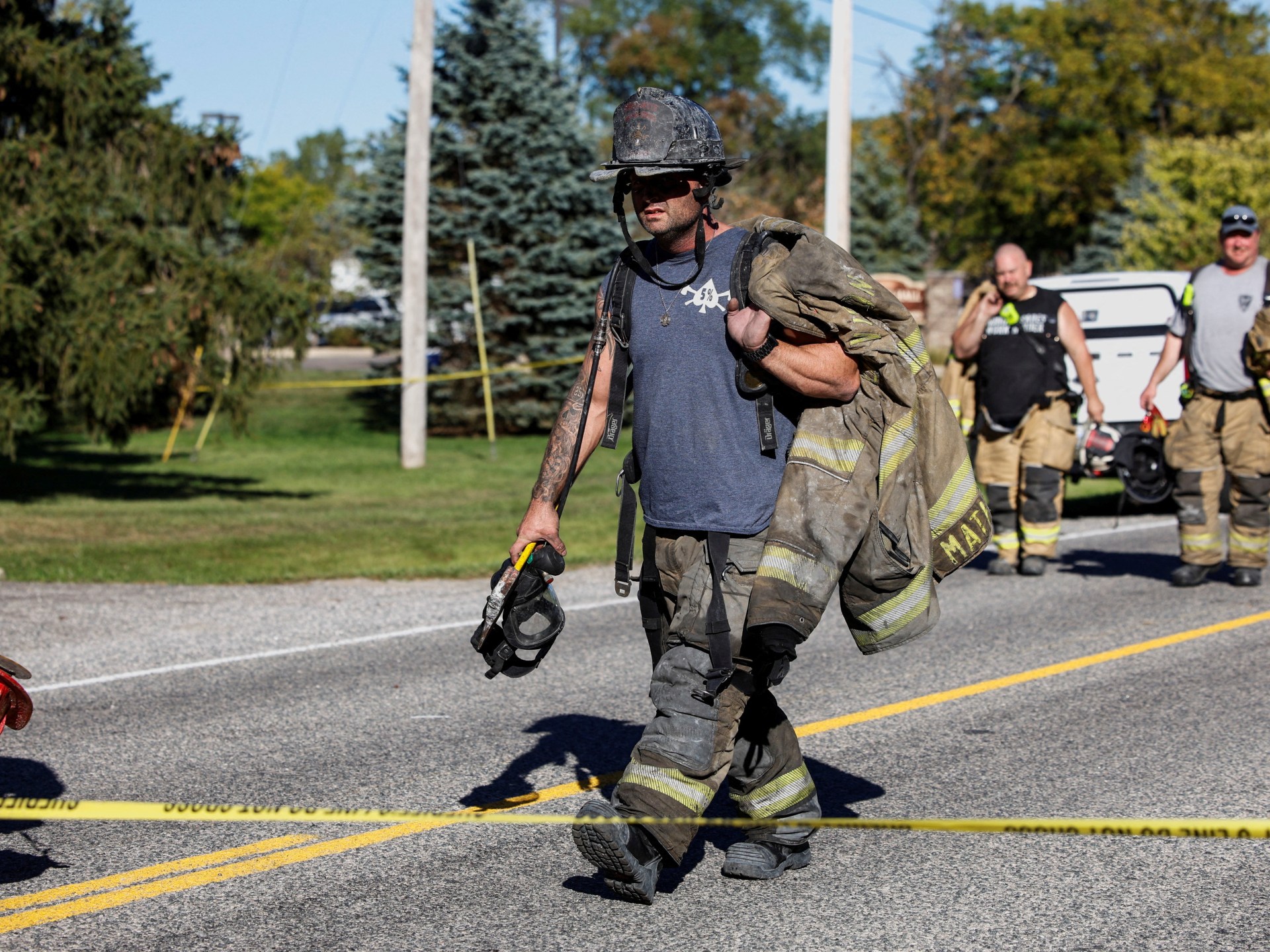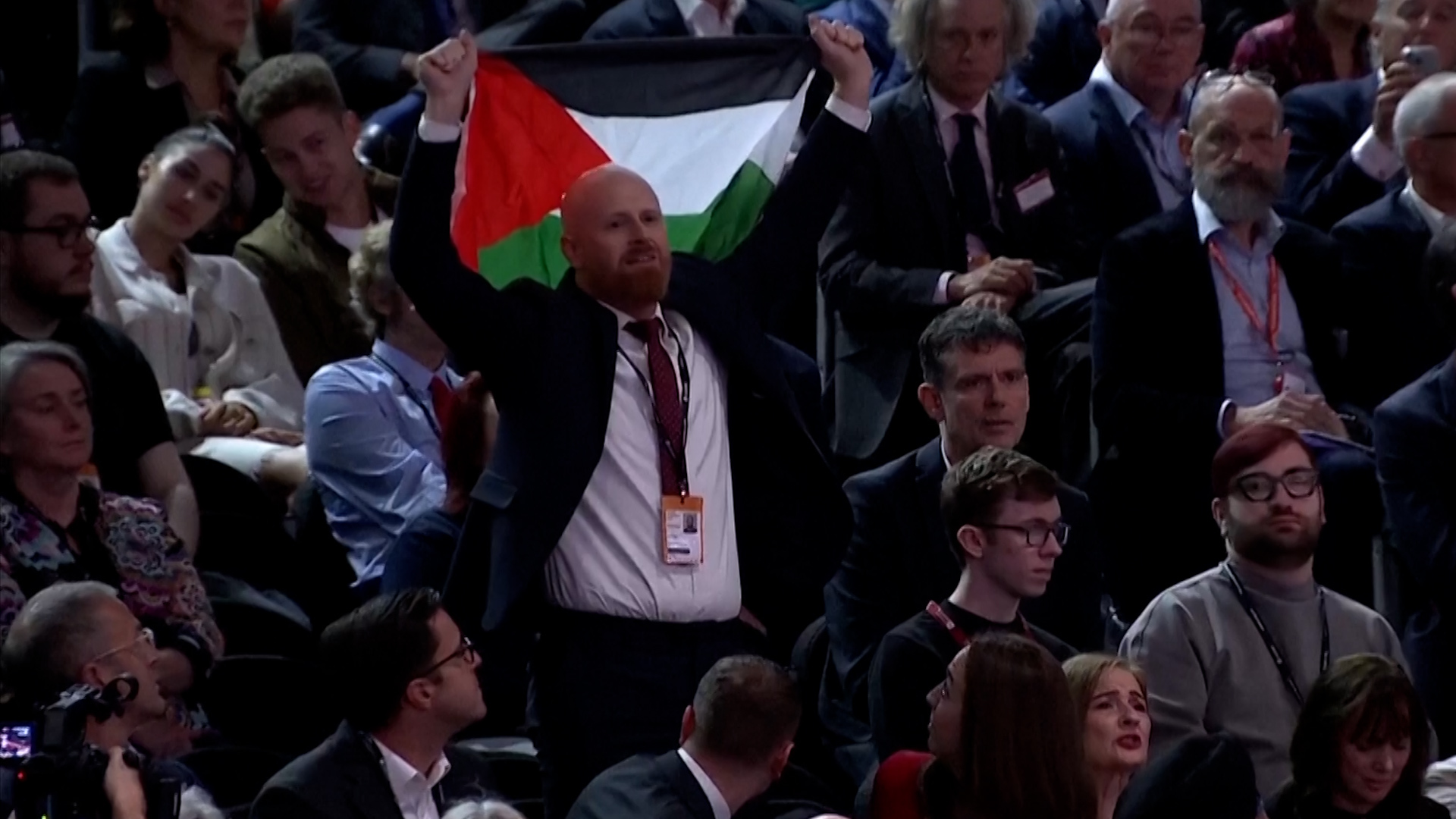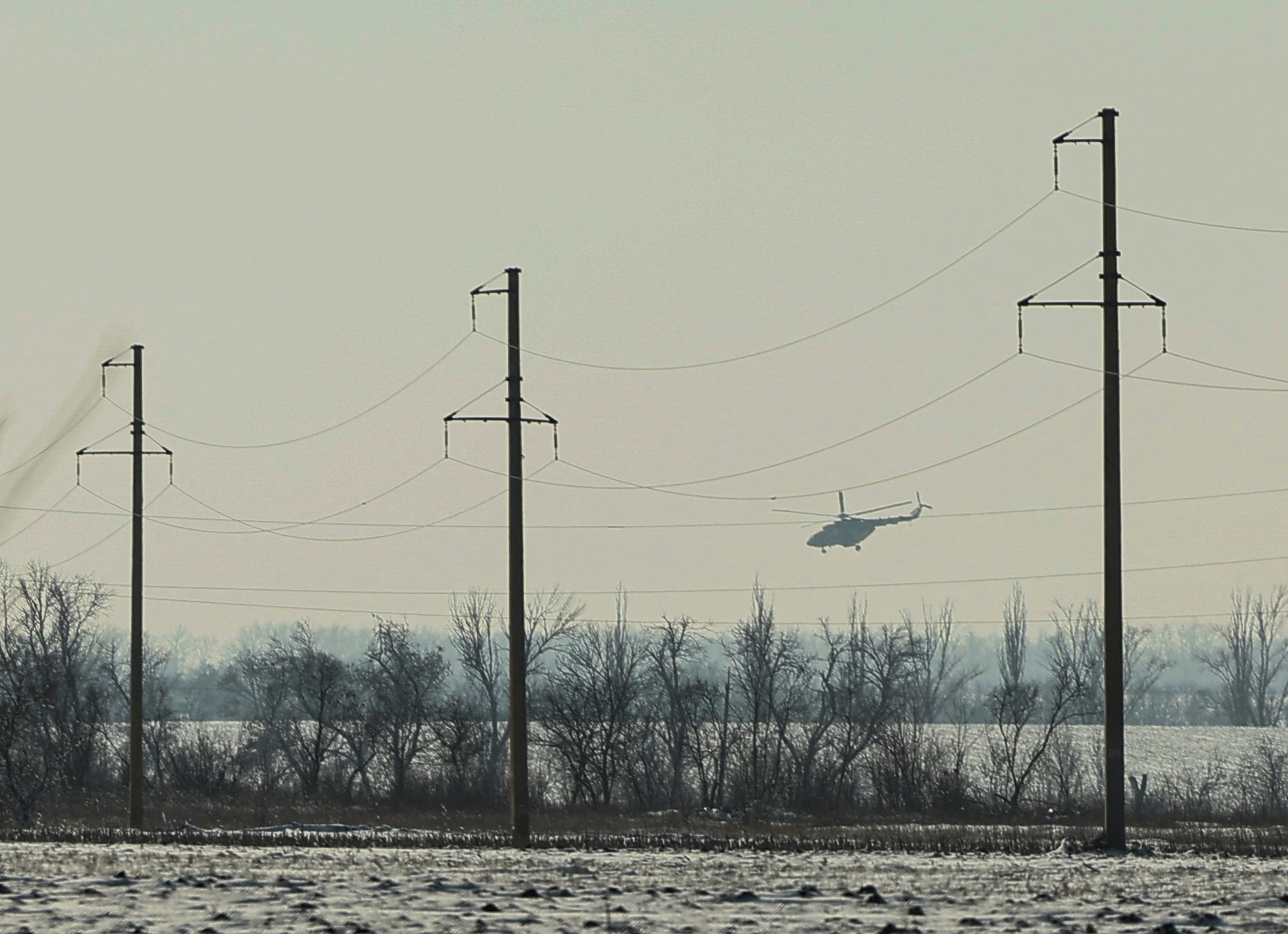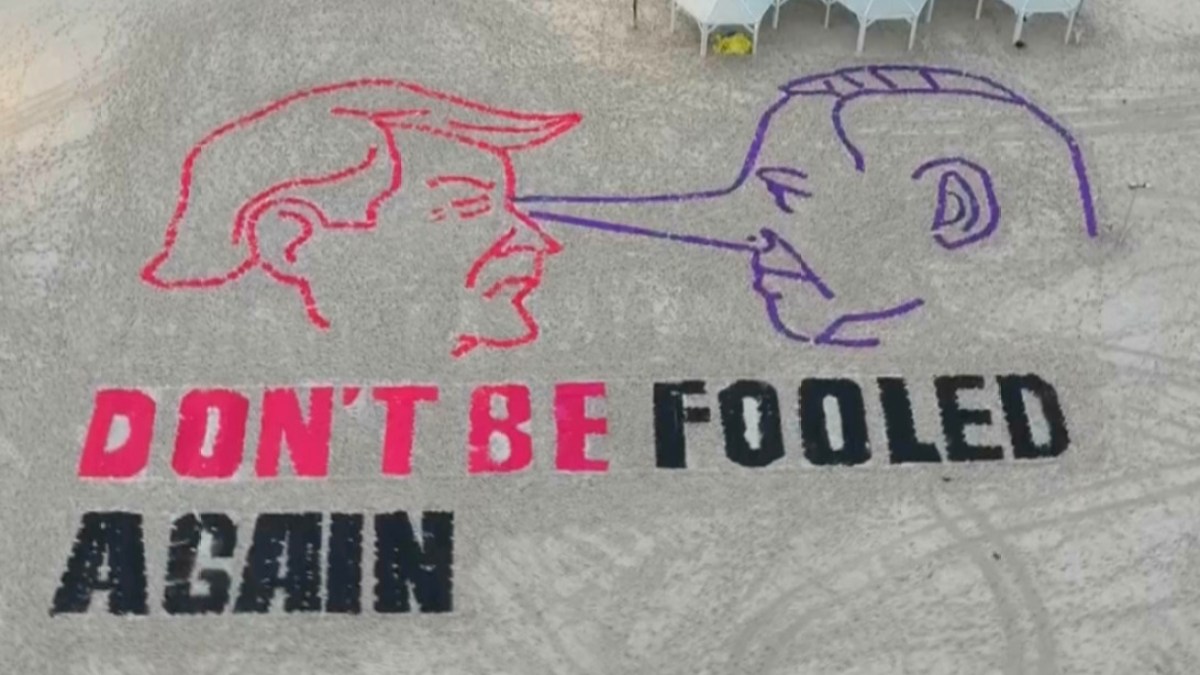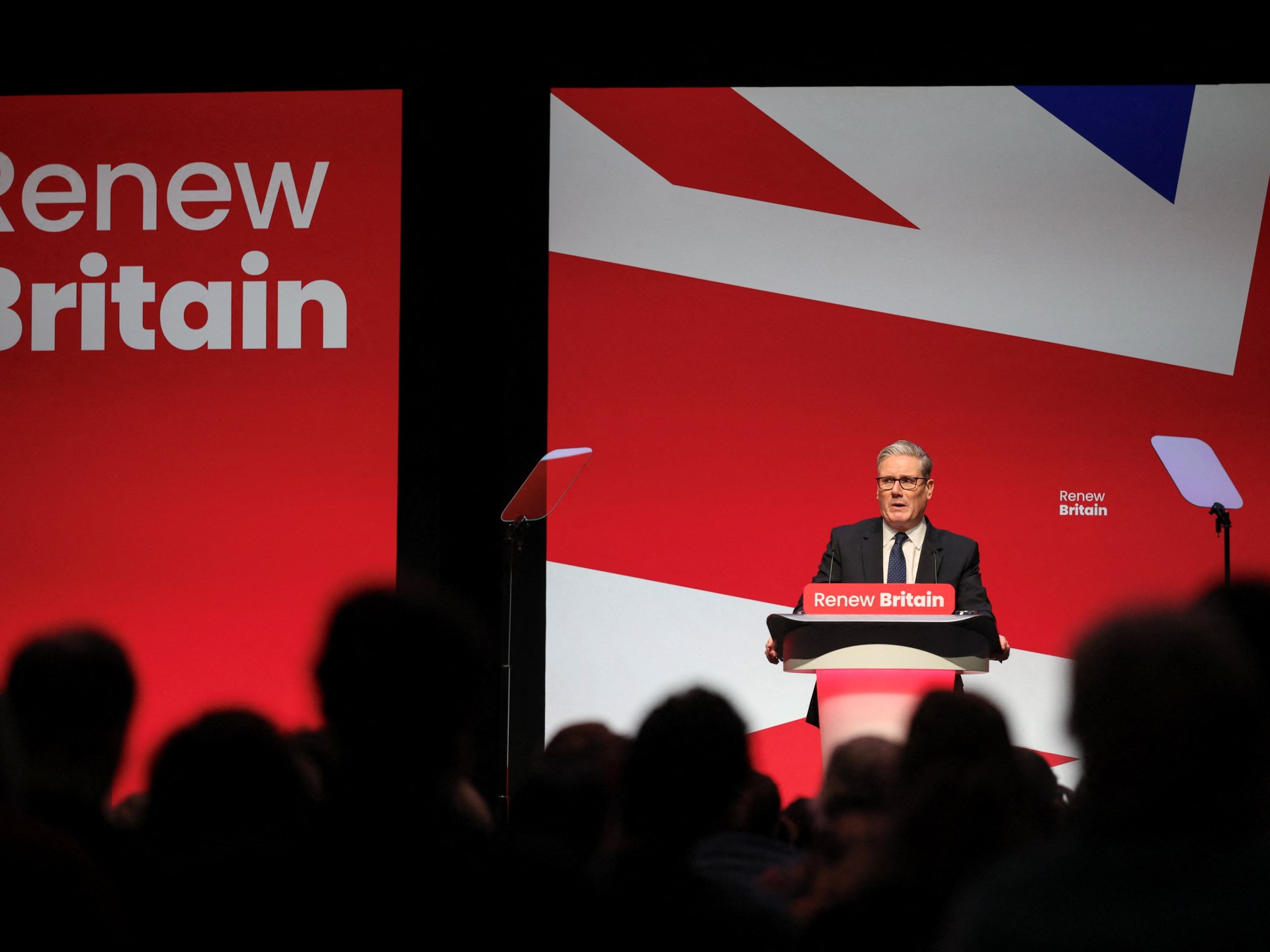Moldova’s ruling pro-West governing party won a majority in the country’s tense Sunday elections, beating pro-Russian parties by a wide margin amid reported attempts to violently disrupt the vote and allegations of interference by Russia.
Results from more than 99 percent of the polling stations counted by Monday noon showed the Party of Action and Solidarity (PAS) clearly in the lead, despite analysis and opinion polls before the vote suggesting that pro-Russian parties would come close and possibly upset the ruling party’s parliamentary majority.
Recommended Stories
list of 4 itemsend of list
The small country is located between Ukraine and Romania. One of Europe’s poorest states, it was part of the Soviet Republic until 1991. The breakaway, semi-autonomous region of Transnistria, which lies along the border with Ukraine, has traditionally supported ties with Russia.
As a result, in recent years, Moldova has emerged as a battleground for influence between Russia and the West.
In a September 9 speech at the European Parliament, Moldovan President Maia Sandu, founder of PAS, declared that this election would be “the most consequential” in the country’s history.
For Moldovans, the elections represented a crucial turning point. The small country with Russia’s war in Ukraine on its doorstep could either continue on its current path towards European Union membership, or it could fall back into the old fold of Russian influence.
Ultimately, despite reports of pro-Russian groups threatening violence, with at least three people arrested in Moldova, and several bomb scares reported at polling booths abroad, the Moldovan diaspora played a key role in delivering a pro-EU victory.
What was the outcome of Moldova’s election?
Nearly all votes cast at polling stations had been counted by Monday. Some 1.6 million people cast their votes, making about 52.2 percent of eligible voters, which is higher than in previous elections.
The ruling pro-EU PAS, led by parliament president and PAS cofounder, Igor Grosu, won 50.16 percent of the vote and about 55 of the 101 seats in parliament, translating to a comfortable majority government, according to the country’s election agency.
The current prime minister, Dorin Recean, appointed by Sandu in February 2023, is expected to retain his position.
The pro-Russian Patriotic Electoral Bloc (BEP), an alliance of four parties led by former president and Russian ally Igor Dodon, came in a far second with 24.19 percent of the vote. The party won 26 seats in parliament. Two parties within the bloc, Heart of Moldova and Moldova Mare, were banned from participating in the election amid allegations they had received illicit funding from Russia.
In third place was the Alternative Party, which is also pro-EU with 7.97 percent of the vote, securing eight parliamentary seats.
Our Party, a populist group, and the conservative Democracy at Home party, respectively, won just more than 6 percent and 5 percent of the vote. That allowed them entry into parliament for the first time with 6 seats each.
What had polls predicted?
Opinion polls had suggested a much tighter race between the ruling PAS and the BEP, which was predicted to come a close second. That scenario would have disrupted PAS’s present control of parliament, potentially forcing it into an uncomfortable coalition with the BEP, and slowing down pro-EU reforms.
Before the Sunday polls, politicians and their supporters on both sides of the debate campaigned intensely on the streets and on TV, but also on online platforms such as TikTok, in an attempt to reach young people who make up about a quarter of the population.
What were the key issues?
EU accession was the single most important issue on the ballot this election. Under President Sandu, Moldova applied to join the EU in early 2022, just after Russia’s February invasion of Ukraine. Chisinau’s goal, alongside a better economy, has been to obtain security guarantees like its neighbour, Romania, which is a member of the EU and of the North Atlantic Treaty Alliance (NATO).
In July 2022, the EU granted Moldova – as well as Ukraine – candidate status, on the condition that democracy, human and minority rights, and rule of law reforms are made. European Commission President Ursula von der Leyen at the time declared that the future of Moldova was in the EU.
However, while President Sandu’s PAS is eager to achieve Moldova’s EU membership by 2028 when her term expires, she has accused Moscow of attempting to scupper this plan in order to continue wielding influence over a country it once controlled.
Russia has considerable support in Moldova, and backs a breakaway, autonomous enclave – Transnistria, located along its border with Ukraine. About 1,500 Russian troops are present there, and the enclave’s government has requested Russian annexation several times.
In a referendum vote last October, just more than 50 percent of Moldovans voted “yes” to joining the EU, a tight margin of victory that was seen as a predictor of this week’s parliamentary elections.
At the time, President Sandu blamed “dirty interference” from Russia for her camp’s thin victory.

Did Russia interfere in these elections?
During the run-up to Moldova’s election, the authorities have repeatedly accused Moscow of conducting a “hybrid war” – offline and online – to help pro-Russian parties to win the vote. Moscow denies meddling in Moldovan politics.
Russia is specifically accused of being behind a widespread “voter-buying” operation – through which voters are bribed to vote for particular parties – and of launching cyberattacks on Moldovan government networks throughout the year.
The authorities have also claimed that Moscow illicitly funds pro-Russia political parties. Two pro-Russia parties – Heart of Moldova and Moldova Mare – were barred from the vote on Friday over allegations of illegal financing and vote buying.
According to researchers and online monitoring groups, Moldova was flooded with online disinformation and propaganda in the months leading up to the vote that attempted to tarnish PAS and raise doubts and concerns about the EU. Researchers found that these campaigns were powered by artificial intelligence (AI), with bots deployed in comment sections on social media or fake websites posting AI-generated content deriding the EU.
International security professor Stefan Wolff, from the University of Birmingham, told Al Jazeera that Russia had indeed tried to influence Sunday’s elections to bring Moldova back under its influence.
“There is very little doubt in my mind and quite convincing evidence that Russia has done basically two things: Tried to bribe Moldovans literally with cash to vote for anti-European parties, and it has exerted massive campaigns of disinformation about what a pro-European choice would mean,” he said.
Wolff added that Russia also attempted to “discredit” President Sandu and PAS’s parliamentary candidates. “This really was a massive Russian operation, but it also, I think, shows the limits of how far Russia can push its influence in the post-Soviet space,” he said.
Google, in a press statement last week, said it had noticed coordinated campaigns targeting the Moldovan elections on YouTube. “We have terminated more than 1,000 channels since June 2024 for being part of coordinated influence operations targeting Moldova.”
What other disruptions to the election were there?
Two brothers and a third man had been arrested in Chisinau on suspicion of planning riots during the election on Sunday, Moldovan police said. According to local media, the police found flammable material in the possession of the suspects.
Last week, police arrested 74 people during 250 raids of groups linked to alleged Russian plans to instigate riots during the vote. Authorities said the suspects, who were between 19 and 49, had “systematically travelled” to Serbia, where they received training for “disorder and destabilisation”.
How did the Moldovan diaspora vote?
Some 17.5 percent of the votes – 288,000 – were cast by Moldovans living abroad, mostly in Europe and the US.
Bomb scares were reported at polling units in Italy, Romania, Spain and the US. Some polling units in Moldova also reported similar scares. The elections agency did not break down how the diaspora voted.
Voters in the enclave of Transnistria – where many people hold dual citizenship with Russia – faced logistical challenges, as they had to travel to polling stations 20km (12 miles) outside Transnistria. Media reports noted long car queues at Moldovan checkpoints on Sunday morning.
Some pro-Russian voters from the enclave told reporters they had been sent back and forth between polling stations because of bomb scares.
How has PAS reacted to the election result?
Speaking to reporters at the PAS headquarters in Chisinau on Monday after the party’s win, PAS leader Grosu reiterated the allegations against Russia.
“It was not only PAS that won these elections, it was the people who won,” Grosu said.
“The Russian Federation threw into battle everything it had that was most vile – mountains of money, mountains of lies, mountains of illegalities. It used criminals to try to turn our entire country into a haven for crime. It filled everything with hatred.”
Prime Minister Dorin Recean also said Moldovans “demonstrated that their freedom is priceless and their freedom cannot be bought, their freedom cannot be influenced by Russia’s propaganda and scaremongering”.
“This is a huge win for the people of Moldova, considering the fully-fledged hybrid war that Russia waged in Moldova,” Recean added. “The major task right now is to bring back the society together, because what Russia achieved is to produce a lot of tension and division in society.”
Last November, Romania cancelled its own presidential elections after authorities alleged that Russian interference had helped a far-right leader win the polls. A second election was held in May this year, which was won by the centrist and pro-EU candidate Nicusor Dan.

What happens next?
The election result was immediately denied by BEP leader Dodon, who called for protests at the parliament building in Chisinau after claiming – without providing evidence – that PAS had meddled with the vote.
In an address on national TV late on Sunday before the results were declared, Dodon claimed his party had won the vote. He called on the PAS government to resign, and asked supporters to take to the streets.
“We will not allow destabilisation,” the politician said. “The citizens have voted. Their vote must be respected even if you don’t like it”.
On Monday, dozens of people gathered to protest the results. It is unclear if the politician will launch a legal challenge.
